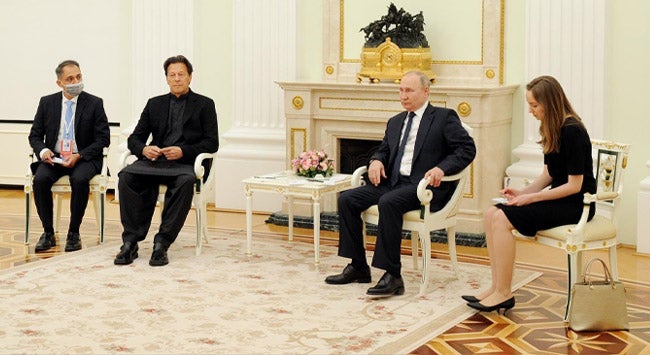Pakistan’s Delicate Balance: Domestic Exigencies, Foreign Sensitivities
Imran Ahmed
1 March 2022Summary
As Pakistan’s Prime Minister Imran Khan faces mounting domestic political and economic challenges, and strained relations with the United States in the aftermath of the Western withdrawal from Afghanistan, his administration is seen to be pursuing closer bilateral relations with Russia. However, hopes of capitalising on improving Russia-Pakistan relations to address significant domestic problems now appear to have met major hurdles, and many now are questioning whether Khan should have gone to Moscow at all at a time when Western nations were working to isolate Russia. The Russian invasion of Ukraine now besets Pakistan with significant domestic, political and diplomatic challenges and uncertainties.
The National Security Policy (NSP), formally launched in early January this year, set out the Pakistani state’s five-year national security vision, and in it, the document noted the fluid nature of international politics, and how great power competitions and regional pivots are defining the race over resources. It also acknowledged the changing nature of cooperation, moving from regionalism to issue based partnerships. The NSP maintained that its relationship with Russia is witnessing a positive trajectory and Pakistan will continue to strive to maximise mutual gains. Indeed, the two states have enjoyed increasing bilateral interaction, and just last year, Russian Foreign Minister Sergey Lavrov visited Islamabad to discuss mutual areas of interest, particularly in the fields of security and defence, energy, counterterrorism and the Afghan peace process. Both Russia and Pakistan share an overlap in their concerns over the developing security situation in Afghanistan. The strain in United States (US)-Pakistan relations in the aftermath of the former’s withdrawal from Afghanistan has pushed Islamabad further towards deepening its ties with China and Russia. To this end, the NSP stated that Pakistan is committed to reimagining its partnership with Russia in the areas of energy, defence cooperation and investment.
It was no surprise then that an entire gamut of ministers and advisors with portfolios ranging from energy, commerce and planning to defence accompanied Prime Minister Imran Khan on his much-anticipated visit to Moscow. At the top of the agenda was the construction of a long-delayed, multi-billion-dollar Pakistan Stream Gas Pipeline which would transport liquified natural gas from Karachi to power plants in Punjab. The ambitious project had suffered numerous setbacks as a consequence of earlier US sanctions, but its revival remains important for Pakistan as its own indigenous gas supplies now dwindle. The visit was framed as an opportune moment for Pakistan to capitalise on a decade of good relations with Russia and to boost its struggling economy and energy sector. For Khan, who has been facing mounting criticism and unrest in Pakistan, it was also an opportunity to showcase a substantial and substantive success as opposition parties in the country rush to bring a no-confidence vote against him. The timing of the visit, however, proved ill-fated.
As Russian forces launched coordinated attacks on several Ukrainian cities, images of Khan’s visit to the Kremlin were relayed all over the world. The optics of the meeting were most unflattering for Khan. More so since only a few days earlier, the Pakistani envoy to Ukraine, retired Major General Khokhar, made statements towards supporting Ukrainian sovereignty and territorial integrity. That Khan had pushed ahead with the meeting at a time when Western nations were banding together to isolate Russia raised questions concerning Pakistan’s position in the crises. Khan’s presence at Moscow gave the semblance of Pakistan’s endorsement of the invasion. However Prime Minister’s office was quick to tweet a diplomatic response which neither sided with the West nor condemned Russia, “The Prime Minister regretted the latest situation between Russia and Ukraine and said that Pakistan had hoped diplomacy could avert a military conflict.”
Analysts now are debating whether Khan should have gone to Moscow at all while others maintain that the visit may serve to isolate Pakistan. However, the negative publicity may be the least of Pakistan’s concerns. The Russian invasion of Ukraine places Pakistan in a bind for its potential in endangering the economic benefits Khan had hoped for as dividends of improving bilateral relations with Russia. Indeed, it is unclear just how sanctions would impact the liquefied natural gas pipeline project. Engaging with Russia also brings the danger of rousing Western contempt and the potential risk of breaching sanctions. Moreover, soaring energy prices would hurt Pakistan as it struggles with sourcing for affordable energy resources, fighting inflation and reducing the rising cost of living. The initial days of the war plunged global markets into turmoil as the price of commodities such as oil and gas surged and stock markets around the world slumped. Pakistan is also a significant importer of Ukrainian wheat, and interruptions caused by the conflict place Pakistan’s food security at risk. The exact longer-term consequences of a protracted war are difficult to determine but projections appear grim.
. . . . .
Dr Imran Ahmed is a Visiting Research Fellow at the Institute of South Asian Studies (ISAS), an autonomous research institute at the National University of Singapore (NUS). He can be contacted at iahmed@nus.edu.sg. The author bears full responsibility for the facts cited and opinions expressed in this paper.
Photo Credit: Facebook of Prime Minister’s Office of Pakistan
-
 More From :
More From :
-
 Tags :
Tags :
-
 Download PDF
Download PDF



